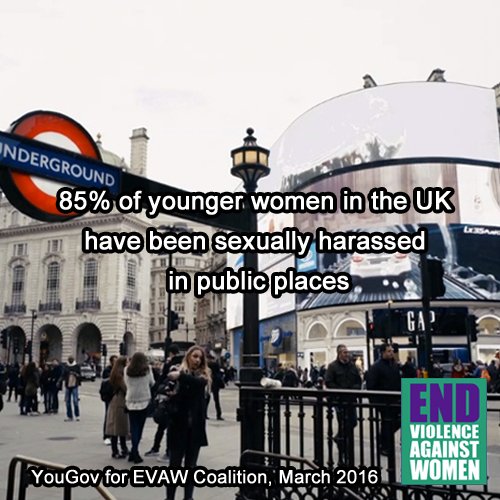 End Violence Against Women Coalition, our allies in the UK, commissioned YouGov to conduct the first national poll on street harassment. The results were released today, for International Women’s Day.
End Violence Against Women Coalition, our allies in the UK, commissioned YouGov to conduct the first national poll on street harassment. The results were released today, for International Women’s Day.
Prevalence:
64% of women of all ages have experienced unwanted sexual harassment in public places. (This is almost the same as the USA, our 2014 study found that 65% of women had been harassed.) Additionally, 35% of women had experienced unwanted sexual touching.
Age:
When they looked at just young women ages 18-24, however, the percentages increased significantly: 85% had faced sexual harassment in public spaces and 45% had experienced unwanted sexual touching.
Related, across all ages of women, most said it began at a young age. More than 1 in 4 said it happened before age 16, and more than 3 in 4 said it happened by age 21.
Bystanders/Upstanders:
Sadly, only 11% of women said anyone had intervened when they were harassed though 81% said they wished someone had.
Changing Their Life:
When it comes to feeling safe, 63% of women (versus 45% of men) said they generally feel unsafe in public spaces and almost half do conscious “safety planning” when they go out in the evenings.
What Can We Do:
When asked what should be done, many said “they supported more police (53%), better street lighting (38%), more transport staff (38%) and public awareness campaigns encouraging others to intervene (35%). No women we asked believed this problem should be ignored and no measures taken.”
Racialized Sexual Harassment:
Because women of color may also face racialized sexual harassment, EVAW partnered with Imkaan to produce a five minute film featuring young women of color talking about their experiences.
In discussing what it feels like to experience racist sexual harassment one woman in the film says:
“My experiences are different as a Black woman than they are for my white friends. I should be ‘up for it’ or I am ‘fair game’, or I shouldn’t care if my body is touched in a specific way.
And another woman says:
“After me ignoring them, that’s when it turns racial, so that’s when it might be ‘you black this’ or ‘you black that…how dare you ignore me’.”
In a press release for the film and survey, Lia Latchford, Policy and Campaigns Coordinator at Imkaan said:
“Our film tells a powerful story of young black women’s everyday experience of racialised sexual harassment. For us, we cannot ‘leave race out of it’ because the way we are treated is based on how our whole identities are perceived as black women. This harassment and abuse often uses racist stereotypes and insults as an attempt to put black women in our place. Everyone, adults and young people alike, need to talk about it and it needs to stop.”
Sarah Green, Acting Director at the End Violence Against Women Coalition said:
“Sexual harassment is an everyday experience which women and girls learn to deal with, but it’s time to hold a mirror up to it and challenge it. We did this survey to find out about the scale of sexual harassment and the impact it has on the way women live. If women are planning their lives around not being harassed or assaulted, they are not free. Women should be free to live their lives without the threat of harassment and violence, not having to plan and limit their choices to make sure they’re safe.”
